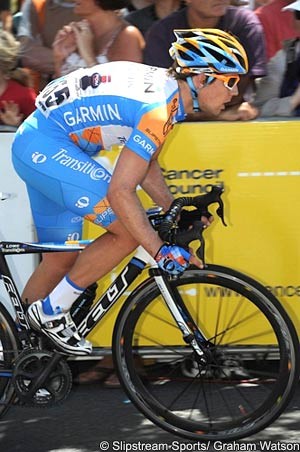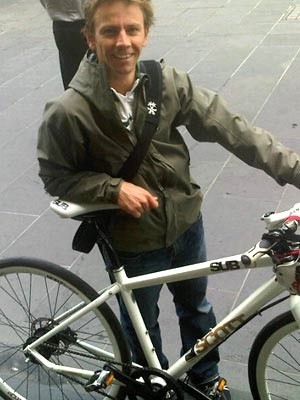Legal action threatened, but team won’t accept calls for a retraction of statements made
 The situation between Trent Lowe and his former team continues to be a tense one, with the rider and his legal representations demanding a retraction and apology from the American team, on the grounds of alleged defamation of character earlier this season. Slipstream Sports CEO Jonathan Vaughters has told VeloNation that while the management company of the Garmin-Cervélo team is open to discussions with Lowe over an unpaid month’s salary, it has no plans to accept the retraction demands.
The situation between Trent Lowe and his former team continues to be a tense one, with the rider and his legal representations demanding a retraction and apology from the American team, on the grounds of alleged defamation of character earlier this season. Slipstream Sports CEO Jonathan Vaughters has told VeloNation that while the management company of the Garmin-Cervélo team is open to discussions with Lowe over an unpaid month’s salary, it has no plans to accept the retraction demands.
Lowe competed with the team between 2008 and 2010, but parted company with it at the end of last season. Relations became strained after the team refused to pay him the final month of his salary, due to his attendance at a team training camp with the Pegasus Sports squad, which was due to be his team for 2011. Vaughters said that he had not sought permission to attend the camp, and was using the equipment of the new team rather than the bike he was contracted to ride.
A letter sent recently by Lowe’s legal representatives McMullan Solicitors in Melbourne to Slipstream Sports, the Garmin-Cervélo management company, sets out the grounds why Lowe feels that he was defamed. It cites several different incidences when the alleged defamation occurred, including in a Slipstream Sports press release on January 26th, plus various media interviews given around that time.
The statements referred to include the following: claims that Lowe and his advisor Martin Hardie were seeking to blackmail the team over a recommendation made by former Garmin directeur sportif Matt White that Lowe should visit the controversial doctor Luis Garcia del Moral; claims that the team members other than White didn’t know of the visits; claims that Lowe and Hardie refused to give information about that referral and claims that Lowe raced just 30 days between 2009 and 2010.
The letter asserts that the total of the statements made also infer that Lowe also has a connection with doping, and failed to perform his duties as a rider.
Lowe’s legal team requested that the team issue a retraction and apology by 5pm on Friday, March 4, and publication/communication of the same on the team’s website, Twitter and Facebook pages for a minimum of four months. It also required them to communicate the same to any individuals that the statements were made to.
Speaking to VeloNation at the weekend, Vaughters said that the requests would not be met. “We are not going to retract anything as what we said was truthful,” he stated, referring to what he said were demands for a payout.
He did however add that he was open to some form of talks. “We have made Trent an offer to settle his contract dispute. The reason why we couldn’t do this previously as in his initial email he basically threatened us with the knowledge that Whitey sent him to Del Moral. He said that unless we paid him, he was going to go public with that. So obviously had we paid him at that point in time, had we negotiated the contract dispute at that point in time, we would have been complicit to a cover-up. That is completely against the charter of the team and completely unethical.”
He said that the team would meet him halfway as regards the unpaid month’s salary, offering him a portion of that. “It is absolutely being hard nosed, it is absolutely being harsh,” Vaughters accepted, “but that is the way I feel this situation is most appropriately dealt with. If Trent had sent me an email back in December saying that ‘I don’t agree with the way you are saying this contract is broken, can we discuss this, can we negotiate this?’ I probably would have been open to that.”
Hardie argues that Lowe has suffered a loss greater than the salary as a result of how things have unfolded. “We consider defamation has occurred. A team manager has told me that at the moment, because of how things have happened, Trent is essentially unemployable. He’s lost a lot because of what has happened.”
Lowe says he was over-raced [see below] and that this plus the recent situation made things tough. “It has made it considerably more difficult to find employment because I haven’t had any race results in the last few seasons,” he told VeloNation. “And obviously the information in the media has not helped matters either. It is still up in the air as to what I will be doing. I have a couple of options, perhaps I will even race my mountain bike some. It is frustrating as I feel I have recovered my health to a good level and am feeling quite good on my bike.”
Wider issues:
In an additional letter sent to Garmin-Cervélo’s management company Slipstream Sports by Lowe’s legal team, a long list of points is laid out detailing the relationship and interaction between the rider and the team over the past two seasons. Aside from details of the Del Moral situation, which has been chronicled in recent weeks, it is stated that the team required him to compete in the 2008 Tour de France despite the rider being run down and overtrained.
The statement also asserts that medical tests carried out before the race back up the claim that he was not fit to take part. VeloNation understands that these refer to an abnormally low testosterone level, which can be a symptom of fatigue.
Lowe completed that Tour, working for the team leaders and placing 74th in Paris, but then experienced more fatigue afterwards. Over the next few months his condition continued to worsen and, according to the letter, he began suffering from ‘various fevers, viral infections and chronic fatigue’ in 2009. He has had no major results of note since the 2008 season, when he was second in the Tour de Georgia and performed strongly in other events.
Lowe claims that the Tour participation was what made things worse for him. “[Matt] White was doing my training program at the time. A little over a week out from the event he even sent me home from a training session as I was too fatigued to do even a moderate session. After this I expressed my concern that I wasn’t in the right condition to start the event. That I didn’t feel well. White assured me that it was normal to feel like this given the amount of training I had done in the last few months.
“I expressed my concerns to White only, as he was my assigned port of call. I trusted his judgment at the time, I was only 23 at and still gaining experience as a professional. I feel this turned out to be a very costly mistake to not seek further opinion.”
Vaughters counters Hardie’s claims that Lowe was sent to the race against his wishes. “Trent wanted to do the Tour, it is not true at all to say he didn’t. There was never, ever a time when Trent Lowe said ‘I don’t want to do the Tour de France,’ not once. The team didn’t force him to ride it, and the team didn’t force him to finish it.”
He said that he considers that his physiology is simply one that is not suited to three week Tours. “Low testosterone is the reason why Chris Boardman had to retire. [Note – Boardman had osteoporosis caused by low tesosterone levels – ed.] Some people can handle three week Tours, others can’t. There are going to be athletes whose bodies become so run down that they are unable to compete at that level. It is sad for them, but that is not my fault.” He added that he felt that Lowe was more suited to other events, perhaps mountain biking where day to day recovery is not as crucial.
 However Hardie states that Lowe’s testosterone level has returned to more normal parameters, following guidance from physical therapist Rob Grace relating to his training and health.
However Hardie states that Lowe’s testosterone level has returned to more normal parameters, following guidance from physical therapist Rob Grace relating to his training and health.
The communications from Lowe’s legal team outline what they say were several areas where the team didn’t look after the rider. Amongst the points raised, it states that under UCI guidelines, Lowe should have had follow up tests when his values were outside of the normal ranges, but this was not done. Hardie said this shows the team did not look after the health of Lowe.
Vaughters argues against suggestions that the team didn’t take care of the riders, saying that the squad did everything it could to help him get over his health issues. “Our medical team put more effort into Trent Lowe than 95% of the riders on the team. We did a lot to try to help him.” He said that Lowe gained a lot of weight and didn’t act as he should have in order to ensure he could function well as an athlete; because of this, he says, the team eventually ran out of patience. This is why communications between them broke down last summer, and Vaughters did not respond to Lowe’s emails.
There are more issues raised and points argued in the documentation sent to Slipstream’s legal representatives, including the circumstances of his referral to Dr. Luis Garcia del Moral. It’s safe to say that Slipstream Sports and Trent Lowe/his representatives have very different views on what happened during his time with the team, and are equally convinced that their positions are correct.
If it ends up going to court, the issues will be further hammered out there, and a judgement will ultimately determine who was right and who was wrong.
In the meantime, Lowe is yet another rider who has been left in an awkward position by the demise of the Pegasus Sports team. Coming after two difficult seasons, he is still waiting for the chance for a new start.